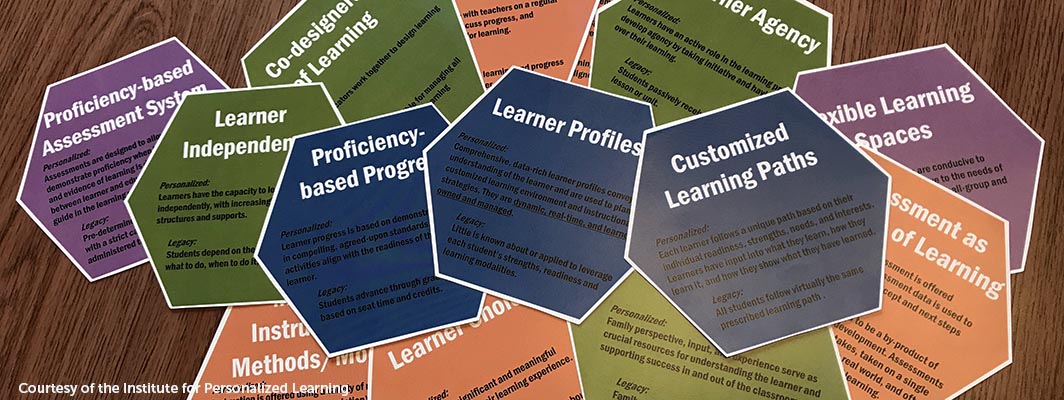
Imagine a world where every learner has the capacity and drive to learn for life.
At the Institute for Personalized Learning, we focus on bringing this vision to life in our work with education leaders and practitioners. Schools across the country are in the midst of shifting from an instructional paradigm to a learner-centered paradigm. When we work with schools and districts, we often talk about developing “POWERful” learners, who are full of Purpose, Ownership, Wonder, Efficacy, and Responsibility.
To make this shift, we need to design a system that develops “POWERful” adult learners as well, who are active participants in their learning experiences. Micro-credentials are a powerful component to include because they support educators to be adaptable, flexible, lifelong learners. Micro-credentials empower educators by showcasing the professional learning skills they are using every day to develop the students in their classrooms.
The Institute has developed a series of micro-credentials around personalized learning implementation based on our Honeycomb Model. The Honeycomb begins with three core components at the center, and moves outward to Learning and Teaching elements, Relationships and Roles elements, and a final layer of Structures and Policies elements. We have developed two foundational micro-credentials, “Understanding the Learner Centered Experience” and “Using the Honeycomb as a Change Strategy,” as well as several micro-credentials that address each layer of the Honeycomb.
District staff we work with often express interest in incorporating micro-credentials into professional learning experiences. Muskego-Norway and Kettle Moraine, two school districts in southeastern Wisconsin, are intentionally building professional learning experiences that align with their learner centered, personalized vision for learning.
Muskego-Norway is just getting started with micro-credentials and determining their alignment with current professional learning. A pilot team is digging deeply into the purpose behind micro-credentials and how they complement professional learning structures currently in place, such as their six high-leverage practices and Wisconsin’s Educator Effectiveness System.
Muskego-Norway is also being intentional about having the voice of adult learners drive this process. The district’s Data & Innovation Specialist, Michelle Plaushines, shared that the district sees immense value in providing responsive, personalized professional learning to their staff. Their goal is to find a meaningful place for micro-credentials that recognize an educator’s skill development and encourage continuous professional growth. Plaushines said, “When the group gets together we sometimes come up with more questions than answers, but the conversations are powerful and the questions are always worth exploring.”
On the other hand, Kettle Moraine has utilized micro-credentials throughout the district for several years. Kettle Moraine has worked closely with the Institute and Digital Promise to develop a system of learner centered practices, ensuring the adult learning process aligns with learner centered practices. Theresa Ewald, the district’s assistant superintendent of teaching and learning, shared that the biggest strength they have seen from the micro-credential process is “treating teachers the way we want them to treat students.”
Like Muskego-Norway, Kettle Moraine also began with a pilot team that explored what implementation could look like. They currently have a variety of micro-credential pathways that educators can choose from.
There are aspects that Kettle Moraine has changed and the process continues to evolve. For example, they decided to have all new educators earn the “Understanding the Learner Centered Experience” micro-credential as part of their professional learning. While Kettle Moraine’s micro-credential process provides a lot of autonomy for educators, they decided to implement this one micro-credential as a foundation for all new staff to ensure common language and launch conversations about learning designs that support learner centered practices.
Kettle Moraine has experienced many positive outcomes that support continuing implementation of this work. While the district connected micro-credentials to their compensation plan, many educators value the trust and respect they feel as active decision makers in their professional learning more. Micro-credentials also provide a great opportunity for educators to learn and grow together and show evidence of implementation across the district. Kettle Moraine staff have many different forms of professional learning to choose from, yet nearly all have chosen the micro-credentials experience. Like youth learners, adult learners want a voice in planning their paths for developing their professional skills.
Micro-credentials show great promise in allowing educators a voice in their professional learning. We strongly believe micro-credentials transform the learning experience for adults as we all work toward transforming the learning experience for youth.